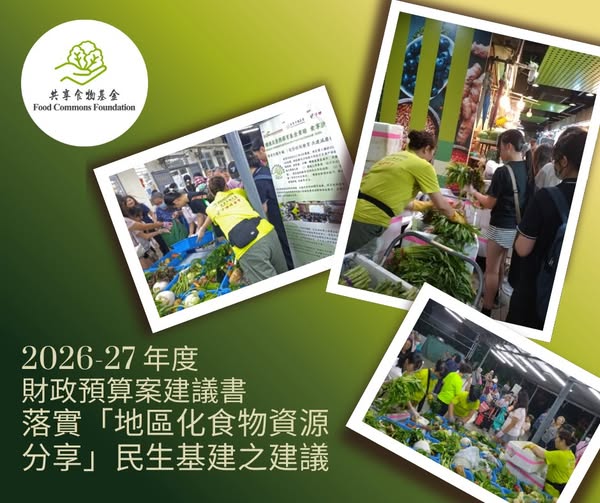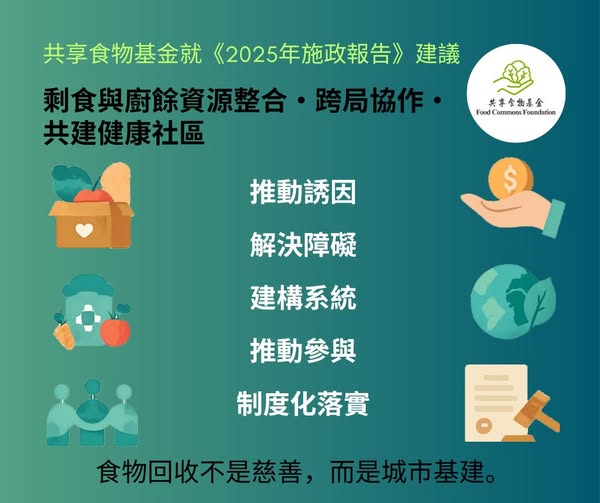This proposal suggests that the "regional food resource sharing" model be institutionalized in the 2026-27 fiscal budget. Through regular funding, space planning, tax incentives, inter-agency collaboration, and community nutrition support, the excess food generated daily in markets and retail outlets can be transformed into community capital.
Our practical experience shows that every 1 yuan of public funds invested generates a 6.5 yuan Social Return on Investment (SROI), making it the most cost-effective tool for targeted poverty alleviation and waste reduction policies.
Furthermore, referencing the successful experience of Shenzhen's Futian District's 24-hour "Food Bank," it is demonstrated that government incentives such as public welfare labeling, tax deductions for donations, and honorary awards can effectively increase corporate participation and form a stable food resource recycling network.

This proposal aims to assist the government in implementing "high-quality development" and "strengthening community resilience" in its 2026 policy objectives, and to achieve the triple policy goals of waste reduction, support for the vulnerable and community governance at low cost.
I. Policy Background
• Hong Kong generates a large amount of surplus food that is still edible every day, but most of it ends up in landfills.
• The community-based "collect and distribute" model has proven effective in many areas, enabling rapid recycling and local sharing in a low-carbon and low-cost manner.
• The government's 2026 policy direction of "high-quality development" and "strengthening community resilience" presents an opportunity to incorporate food resource recycling into institutionalized support.
• Operational data from local non-profit organizations demonstrate that localized models are highly efficient, cost-effective, and sustainable, making them important tools for targeted poverty alleviation and waste reduction policies.
II. Policy Opportunity
When formulating the 2026-27 Budget, the government can leverage institutionalized funding and space allocation to allow experienced organizations to deeply engage with communities, ensuring that surplus food from markets and businesses does not end up in landfills but is instead transformed into resources for neighborhood mutual aid.
This approach simultaneously addresses:
• Waste reduction and carbon emission policies
• Financial pressures on low-income families
• Community resilience and mutual aid networks
• Public finance efficiency
III. Specific Recommendations
1. Space Development: Establish Regular "Community Food Sharing Stations"
Recommendations
• Establish "Community Food Sharing Stations" in vacant or recyclable spaces within existing public housing estates (such as former mutual aid committee sites and vacant shops).
• Reserve independent spaces in the planning of new housing estates and new development areas (including the Northern Metropolis).
• Include food sharing stations in regular funding programs.
Benefits
• Enable professional organizations to cultivate long-term community involvement.
• Prevent edible resources from ending up in landfills, directly converting them into community capital.
• Reduce future costly redevelopment.
2. Financial Incentives: Implementing "Food Resource Recycling Tax Incentives" and "Green Label" Certification
Recommendations
• Profits Tax Deduction: Provide reasonable tax deduction arrangements for businesses donating excess food.
• Green Label and Public Welfare Marking: Establish an official certification system to recognize actively participating businesses.
• Honorary Award System: Referring to the practices of Futian District, Shenzhen, establish an annual "Food Saving Partner" or "Waste Reduction Contribution Award."
• Policy Incentive Integration: Give appropriate priority to certified businesses in government leasing, procurement, or market arrangements.
Benefits
• Drive business behavior transformation through financial and reputational incentives.
• Compensate merchants for labor costs, increasing their willingness to donate.
• Align with waste charging policies, transforming "disposal costs" into "public welfare."
• The Shenzhen case demonstrates that this model can attract a large number of enterprises to participate long-term.
3. Planning Support: Mandatory Reserved Space for Food Recycling in New Development Areas
Recommendation
• Mandatory reservation of food recycling and sharing space during the planning phase of the Northern Metropolitan Area and new markets.
• Spaces should be located near markets, shopping malls, or transportation hubs to support the "collect and sort" model.
Benefits
• Avoids future renovation costs.
• Accelerates pilot implementation, supporting waste reduction and carbon reduction goals.
4. Human Resources: Supporting "Localized Human Resources" and Professional Management
Recommendations
• Establish a special fund to appoint grassroots residents in the district as "Food Saving Ambassadors."
• Responsible for ensuring the quality of food recycling in markets, timely sorting, and distribution in the vicinity.
Benefits
• Create local green jobs.
• Maintain a low-carbon, low-manpower, and high-efficiency model.
• Strengthen residents' sense of belonging and cohesion within the community.
5. Community Support: Strengthening the "Community Nutrition Mutual Aid Network"
Recommendations
• Support sharing stations in providing "community nutrition subsidies," directly benefiting the elderly and low-income families.
• Collaborate with nutritionists and social welfare organizations to provide healthy eating education.
Benefits
• Alleviate the pressure of the cost of living.
• Establish a closer mutual aid safety net.
• Enhance the overall health and resilience of the community.
IV. Fiscal Impact
• High Return on Investment: Every NT$1 invested in public funds generates up to NT$6.5 in social returns.
• Waste Reduction Benefits: Reduces waste disposal costs for businesses and decreases carbon emissions.
• Public Finance Benefits: Achieves the triple goals of waste reduction, support for vulnerable groups, and community governance at low cost.
V. Recommendations for Inter-departmental Collaboration
It is recommended that the Financial Secretary lead the establishment of an inter-departmental collaboration mechanism, including:
• Environment and Ecology Bureau: Coordinating waste reduction and carbon emission policies.
• Labour and Welfare Bureau: Supporting low-income families and the elderly.
• Housing Bureau: Providing space planning and housing estate facilities.
• Homeand Youth Affairs Bureau: Coordinating district networks and community spaces.
Inter-departmental collaboration can avoid duplication of investment and improve policy continuity and effectiveness.
VI. International and Regional Cases
• Shenzhen Futian District 24-Hour Food Bank: Successfully attracted 87 companies to participate through incentives such as public welfare labeling, tax deductions for donations, and honorary awards, forming a stable food resource recycling network.
• EU CULTIVATE Scheme: Emphasizes integrating food systems into urban planning and community participation.
• UK WRAP Scheme: Assists retailers in reducing food waste through "Target, Measure, Act".
• Australia End Food Waste CRC: Promotes nationwide waste reduction through government funding and cross-sectoral collaboration.
These cases demonstrate that, when coupled with policy incentives, spatial planning, and community participation, food sharing can become a crucial infrastructure for urban governance.
"Regional food resource sharing" is a low-input, high-efficiency model originating from local practices and gradually maturing, capable of simultaneously addressing multiple policy objectives such as waste reduction, support for vulnerable groups, and community building.
We earnestly request the Government to recognize the professional value of this model in the 2026-27 Budget and support its continued and orderly development across districts through institutionalized funding, spatial planning, and inter-departmental collaboration, thus opening a new chapter for resource utilization and community mutual assistance in Hong Kong.
Food Commons Foundation
January 12, 2026
CC: Environment and Ecology Bureau
Labour and Welfare Bureau
Housing Bureau
Home and Youth Affairs Bureau
Build wholesome communities, cooperate across departments, and incorporate resources for food and kitchen waste.









